How To Effectively Conduct A Keyword Research In 3 Steps
Did you know that Google processes over 8.5 billion searches per day?
Google has been consistently providing results that are accurate and relevant to its search users. This is done through understanding the users’ intent when searching for a query and directing them to websites that contain the accurate answers.
This is why you need keyword research.
If you don’t know what keywords you should target, it is nearly impossible to rank or optimize your website on search engines. But with proper research, you will obtain the necessary keyword data to target the right keywords and answer your audience’s search queries.
Keywords are the foundation of an on-page SEO strategy. If you’re curating your content on a topic with keywords that no one is searching for, you probably won’t get substantial web traffic from search engines–even if you’re ranked #1.
Here’s what will be covered in this article:
- What is keyword research?
- Why keyword research is important?
- How to do keyword research?
What is keyword research?
Keyword research is the practice of understanding the search queries your target audience type into search engines when looking for your content or website. As you perform your research, you will analyze and discover which keyword opportunities you should target.
Keyword research would provide you with keyword data that will answer these questions:
- What are people searching for in search engines?
- How many people are searching for this term every month?
- What other variations of the terms are people using in search engines?
- What is the intent behind those terms when people search for them?
- How hard is it to rank for this term?
Why is keyword research important?
When you use keywords that your target audience normally search in your content, they can easily look for your website, blog, or local business. That is why it’s important to conduct proper keyword research.
Here are other reasons why it’s important to have a proper keyword research.
1. Avoid losing your audience and web traffic
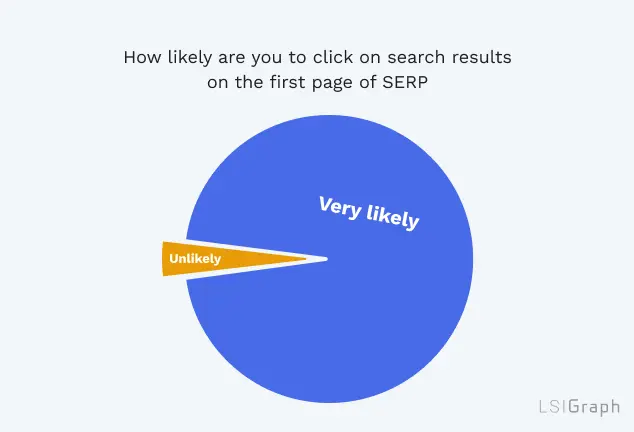
90% of respondents said they are more likely to click on search results on the first page of SERP. Hence if you don’t target the right keywords and rank in the top 10 for search results, you may already potentially lose out on a large chunk of your audience and website traffic.
2. Increase visibility of your brand/business on search engines
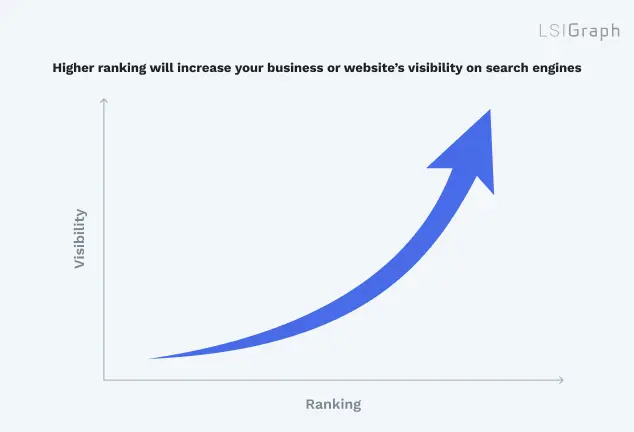
By targeting and optimizing for the right keywords, you will easily rank high for the search terms that are relevant and accurate for the keywords. By doing so, a high ranking will also increase your business or website’s visibility on search engines.
3. Understand your audience’s intent behind their search queries

Another reason why keyword research is important is so you can identify the audience’s intent behind a search query. Understanding the search intent gives you an idea on how you should craft your content.
When you create that content that accurately answers the query’s intent, you also answer the questions your audience have in mind.
How to do keyword research?
You may find that there are a lot of various ways to conduct keyword research. But here’s a strategy the LSIGraph team has used and found to be effective time and time again. By following the methods below, you will know how to do keyword research effectively and properly.
Step 1: Find keyword ideas based on your understanding of your business/industry.
To begin your keyword research process, you need to understand the words and phrases that are relevant to your business. You also need to have solid knowledge of your industry and all the jargons that may be commonly used. This is especially important if you're starting a new business and looking to compete for established products or services. The ideas and knowledge you have will provide a basis for you to start generating your keyword ideas.
That said, let’s take a look at how you can find keyword ideas to start your SEO keyword research.
-
Brainstorm “seed” keywords
Seed keywords are words or phrases which you can use as the focal point in a keyword research process to find even more keywords. These keywords generally do not have any modifiers or changes.
For example, suppose your keyword is “weight loss”.
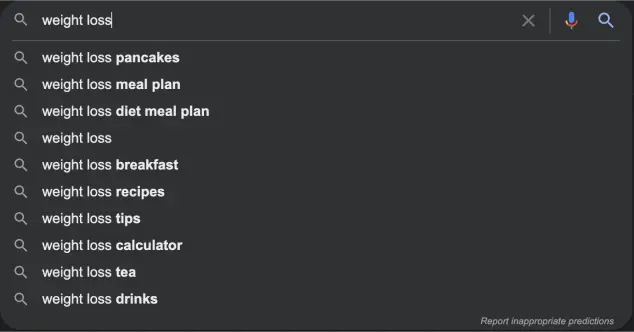
Suggestions for the keyword “weight loss” on Google search results You will notice that there are various modifiers that are added with the keyword, such as pancakes, meal plan, recipes, and so on.
Seed keywords usually contain only one to two words. Because seed keywords are often short, they can also be quite competitive, making it difficult to rank high for these keywords. You want to take these seed keywords and expand on them by adding modifiers or lengthening the phrase.
Identifying seed keywords will also help you to build your topic and keyword clusters. When you build your clusters, you will find that there are new ideas and content to write about.
-
See what keywords your competitors rank for
If you have no idea where to start your SEO keyword research, you can always turn to your competitors and see what keywords they are using. Your competitors would have found their top keywords that consistently bring traffic to their websites.
If you haven’t got the faintest idea of who your competitors are, then you need to start identifying those competitors first. Remember the list of keywords that you have from your seed keywords and clusters?
Use one of those keywords in Google and see who is ranking on the first page.

The top results for the keyword “how to make fluffy pancakes” Note down the competitors. When you’ve identified your competitors, place them in a competitor analysis tool to discover all the keywords they are ranking for. Who knows, you may even be surprised at some of the keywords you may discover!
Even if you have a sound understanding of your business and industry, you can still a whole array of keywords that you may have never found through keyword research only.
-
Use keyword research tools
If you have exhausted your keyword ideas from the previous two methods, you can still use keyword research tools to look for them. Keyword research tools work in the same way, but it’s a faster process as you no longer need to rack your brain to come up with keyword ideas.If you have exhausted your keyword ideas from the previous two methods, you can still use keyword research tools to look for them. Keyword research tools work in the same way, but it’s a faster process as you no longer need to rack your brain to come up with keyword ideas.
Most keyword research tools will offer relevant data so you can decide on what keywords you should target. Among some of the data that you will need to look at is: monthly search volume, keyword difficulty, search intent, etc.Most keyword research tools will offer relevant data so you can decide on what keywords you should target. Among some of the data that you will need to look at is: monthly search volume, keyword difficulty, search intent, etc.
Enter your seed keyword (or any other keyword) in the tool, and your keyword research tools will extract the results from their database and infrastructure.Enter your seed keyword (or any other keyword) in the tool, and your keyword research tools will extract the results from their database and infrastructure.
Here’s the results you would get from LSIGraph if you search for the same keyword.Here’s the results you would get from LSIGraph if you search for the same keyword.
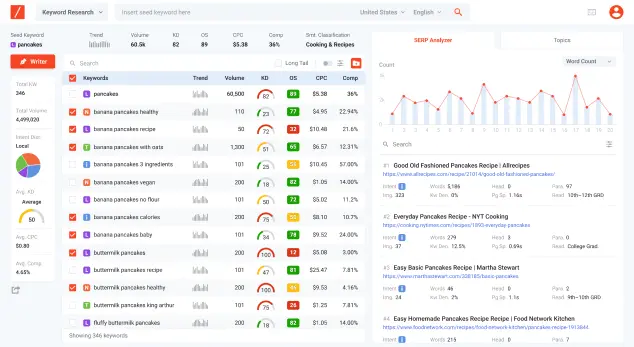
LSIGraph’s keyword research tool shows you related keywords that are related to “pancakes” Once you obtained the data you need, export the keywords and you can begin to create your content.
There are also other free keyword research tools that you can use like Google Keyword Planner. Let’s try the same keyword and see what results will be returned:
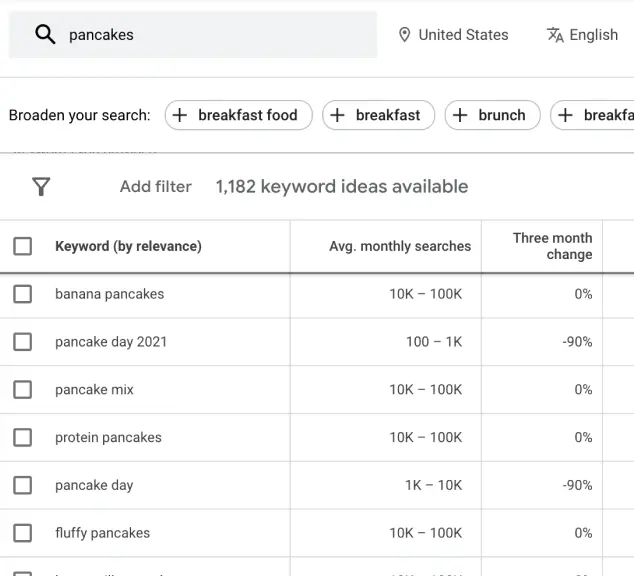
Here’s a list of keyword ideas for the keyword “pancakes” from Google Keyword Planner From the image above, there are a few keywords you can consider to craft your content around. Interestingly enough, “pancake day 2021” is still considered relevant as a keyword idea.
Besides Google Keyword Planner, there are other free keyword research tools. You can use them, but you may find that they do not offer you as much data. If you’re looking for a keyword research tool, do get LSIGraph as it’s one of the best tools out there at an affordable price.
Step 2: Choose the right keywords that will reach out to your audience
Now, you know where to look for and generate keyword ideas. If you used a keyword research tool, you would definitely have more insights and analytics that comes along with the keywords.
But you need to select the right keywords so you can truly reach out to your target audience. Otherwise, you would have lots of content that your audience would never read, mostly because they do not look for those keywords.
Let’s filter the list of keywords that you currently have to find the best keywords that you would rank for.
-
Low-hanging fruit keywords

Established businesses and brands will normally attempt to rank for extremely high search volume keywords. As they are already established, their names would hold more authority. And Google typically rewards these authoritative brands over other, smaller names.
Instead of competing against these brands, it’s better if you shift your focus on keywords that have a better chance of ranking. Start looking for low-hanging fruit keywords.
These are keywords that have moderate search volume but with low keyword difficulty. With a low difficulty, you won’t have to go through a hard time when attempting to rank for the keyword. While the search volume may be lesser, if you eventually rank for all the low-hanging fruit keywords for your business/industry, you will eventually gain more traffic then you opponents.
-
Keywords with the right target intent
You also have to take a look at the user’s intent. Whenever a user enters a search query in the search engine, they are looking for an answer to that query. Hence, you need to ask: is your audience looking for information, or are they looking to make a transaction?
Search intent is one of the most important factors in keyword research. It helps you pinpoint what your audience is looking for, so you know how to meet their needs by crafting your content around the intent.
Thus when it comes to keyword research, user intent is also one of LSIGraph’s main focuses. Identify the search intent of each keyword so you would have content that satisfies the query of your audience. You can discover the intent of keywords on LSIGraph’s keyword research module:
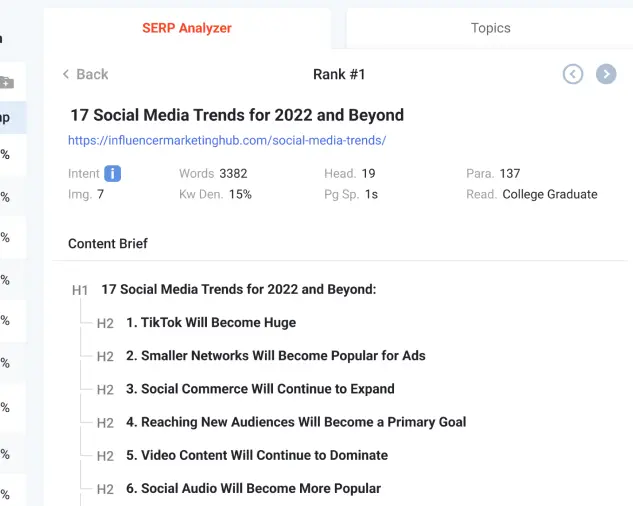
The search intents are labeled with an icon and a letter beside each keyword These are the search intents that would be useful to you:
- Informational – The user is looking for information or an answer
- Navigational – The user is looking for a particular website
- Transactional – The user is seeking to make a purchase for a product or service
- Local – The user is looking for a product, service, or information near their search location
LSIGraph also has a SERP analyzer that assists you by going through the top 10 results and gaining insights on the top performing content. By analyzing the top 10 content, you will have a better gauge on how you should outline and draft your content.
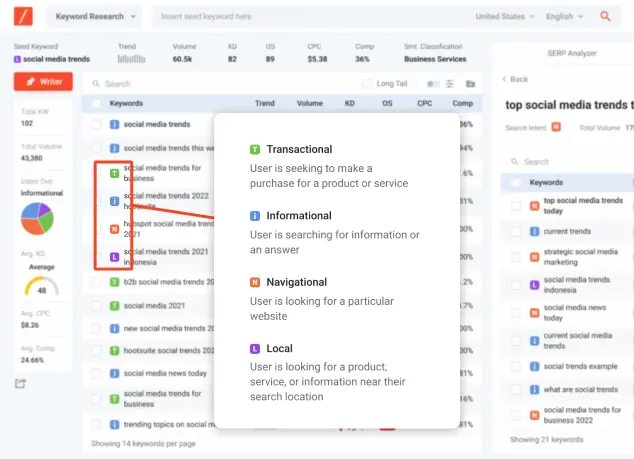
Get your content brief outline by looking at the top 10 results -
Long-tail keywords
Long-tail keywords are keywords or phrases that usually contain at least 3 or more words. They are longer because users are employing more specific keyword phrases when looking for an answer.
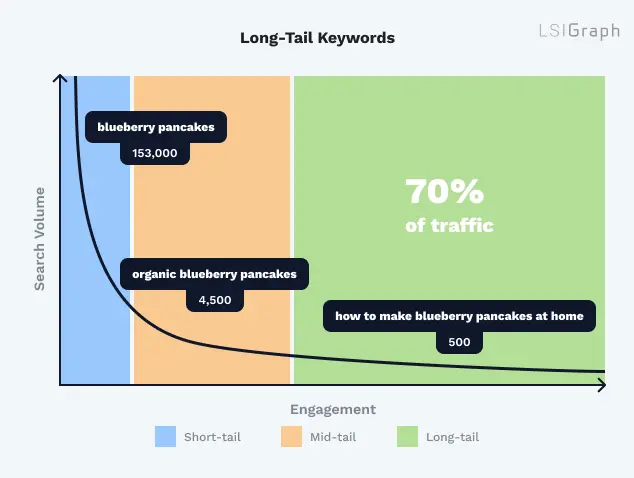
The longer the keyword, the more traffic you will get Generally, long-tail keywords have lower search volume than short-tail keywords. Although they may have a lower search volume, that also means there is less competition when you try to rank for the keyword.
While the traffic may be lesser, you’re going to attract quality traffic as you have content that’s targeted at their long-tail search query. These are a few examples of long-tail keywords for the target keyword “breakfast”.
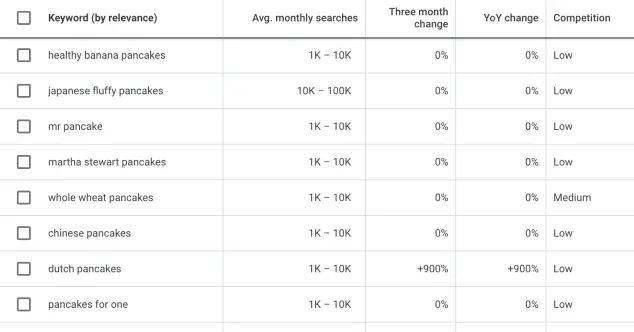
The long-tail keywords that appear for the keyword “breakfast” in Google Keyword Planner -
Keywords with brand names
These are also known as branded keywords. Branded keywords are words or phrases that are related to your brand, products, or services. These are searches that are performed when a user is about to make a purchase.
Here’s a few examples of branded keywords that you’ll definitely recognize in an instant:
- iPhone
- Nike
- Big Whopper
- LSIGraph
By adding your brand name to your targeted keyword, you’re looking for more and better opportunities for quality interactions and improvements with your audience. In turn, these will increase the potential for conversions down the road.
Branded keywords that are used in lead nurturing process aim to attract even more customers, perhaps even readers and visitors, to the blogs. In the longer run, this will help increase your ranking on search results as well.
To find branded keywords, you can use specific tools. A common tool that is used is Google Alerts. You can get notifications whenever your brand is mentioned on the Internet. This will help give you insights into what users are discussing about your brand or business.
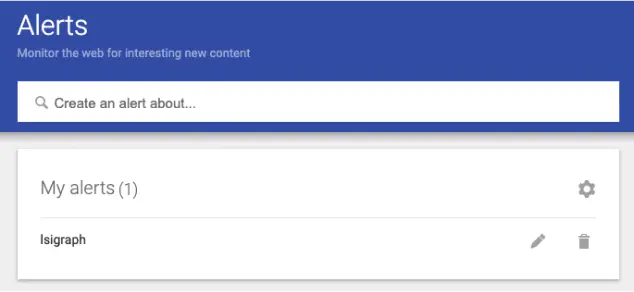
The long-tail keywords that appear for the keyword “breakfast” in Google Keyword Planner -
Localize keywords
Google has iterated that 76% of users who search for something nearby on their mobile phone will visit a related business within a day, with 28% of those searches resulting in a purchase or a customer.
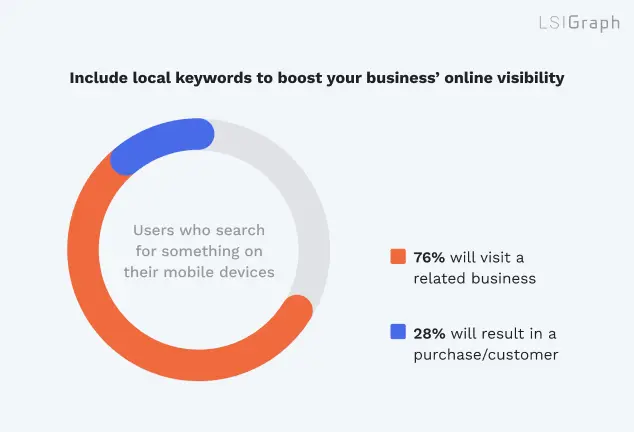
If you’re running a brick-and-mortar business with an online presence, you may find it easier to insert local keywords into your content. Local keywords help search users in a targeted area to find a business easily. For that reason alone, it’s completely necessary to include local keywords to boost your business’ online visibility.
Local keywords are usually based on any short-tail keywords, but with local modifiers (pancakes near me) or a geo-specific keyword (pancakes New York). When users search for these queries, they are looking for a business location that would be the solution to their question.
-
General keywords
General keywords are broader terms that are less targeted, but bring in a bigger group of audience. General keywords may be harder to rank for, but you need these keywords to reach out to as many people as possible.
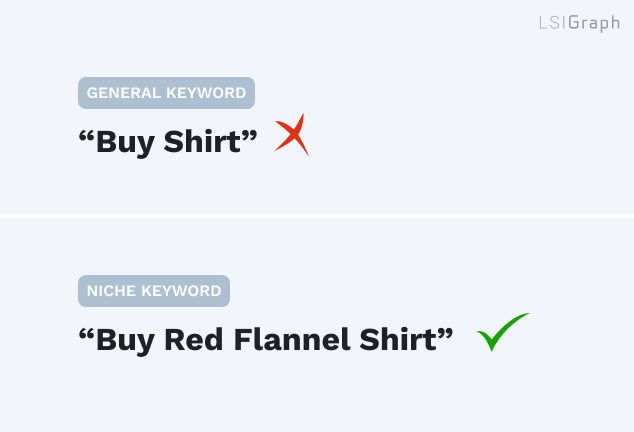
For example, a person looking to buy a shirt would search for “buy shirt”, which is a general keyword. Another person may search for “buy red flannel shirt”, a niche or specific keyword.
While the niche keyword would accurately answer the users’ intent, it would bring less visitors and traffic to your website. With a general keyword, you would bring more traffic. And there’s a chance that a small percentage of those traffic would go through other pages in your website to find what they are looking for.
Step 3: Build a keyword list from your research for your content creation
If you’re at this stage, you should already have selected keywords you are confident would reach your audience. Now, it’s time to build a list from these keywords. Think of your keyword list as a sitemap for your website.
The list outlines keyword-targeted content that goes on your site. If not done properly, you may have content that aren’t connected to one another. You may also spend lots of time trying to reoptimize your content and not getting the results you wanted.
Let’s take a look at how you can build your keyword list.
-
Group similar keywords together

You can group keywords together based on how they can mean the same thing. For example, “keyword” and “search query”. They imply the same meaning, but the only difference is who it is used by.
However, you only want to select the most relevant keyword that best matches your content. Google’s algorithms will accurately analyze the search intent and provide results that would answer the users’ queries.
Here’s an example of similar keywords being grouped together:
- Pizza delivery
- Order pizza
- Order pizza online
- Deliver pizza
-
Group by topics
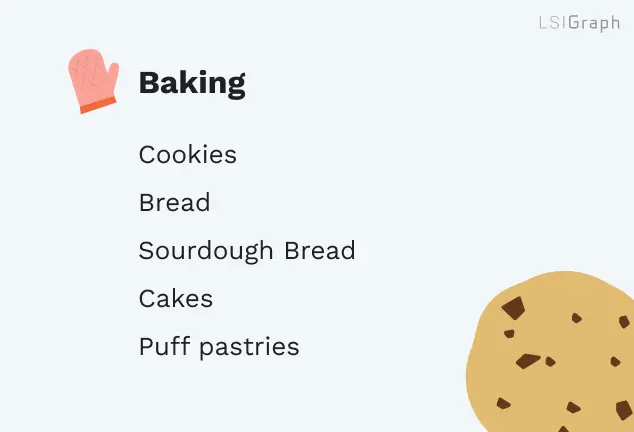
You can also group the keywords together based on their topical relevance. As you group them according to topics, you will find that it’s easier as you would have the outlines all the different content you can have in your website.
This works especially well if you run a blog that covers an industry. As you have multiple topical groups to write about, you can always connect them together by placing internal links to send signals to Google that the topics are related.
Let’s look at an example. If you have a blog that is about baking, you’d have a lot of keywords that you can group according to their topics:
- Cookies
- Bread
- Sourdough bread
- Cakes
- Puff pastries
-
Group by buyer’s journey
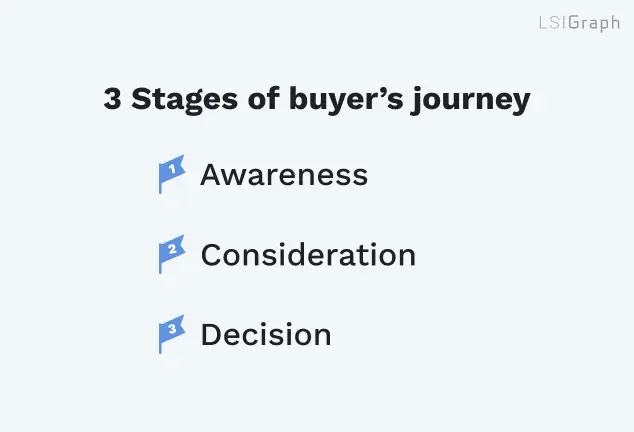
A buyer’s journey is the active process a potential buyer goes through when making a purchase. There are 3 stages in this journey: Awareness stage, consideration stage, and decision stage. In each of these stages, you have the potential to create content according to those content.
In the awareness stage, a buyer is looking for answers to their problems. Search queries that are used here are most often question-based or informational in intent. In the consideration stage, the buyer is looking for possible solutions that could solve their problems.
In the decision stage, a buyer is ready to make a purchase and are making comparisons or review. The intent that can be found here is mostly either commercial or transactional.
As you group the keywords according to the buyer’s journey, you’ll discover that you can have multiple content that would match the different stages of the buyer’s journey, eventually convincing them to make a purchase from your website.
To better illustrate how you can group keywords according to a buyer’s journey, let’s look at how you can group the keywords into different stages for when a buyer intends to purchase a mobile phone.
- Awareness stage – Call people, call friend, how to call my friends
- Consideration stage – Types of mobile phones, best mobile phones
- Decision stage – apple vs samsung, oppo vs apple, android vs ios, galaxy vs iphone
Conclusion
Understanding the importance and how to do keyword research will help you in a long way as you begin your SEO journey to reach out to your target audience. When you find the right keywords and create content around them, you will be able to get the high rankings you wanted as well as the traffic you yearned for.
Using LSIGraph as your keyword research tool will help you immensely in achieving your SEO goals. After your keyword research, you will need to start your SEO writing to write better content that fits the criterias of SEO. You can click here to read more about SEO Writing.
Tools to speed up your keyword research
If you’re looking for more tools to speed up your keyword research, do check out the these tools! They’re powerful and would be valuable additions to your repertoire of keyword research tools:
RankingGap – You can discover your competitors’ ranked keywords that you don’t rank on search results with this tool. This is one of the few unique tools to place emphasis on keyword gap analysis and how you can close that gap.
Google Keyword Planner – Google Keyword Planner is one of the most frequently used tools for keyword research for most digital marketers. The only downside to this tool is that Keyword Planner does not show you the exact search volume for the keywords.
LSIGraph – Search your seed keyword in LSIGraph and get data like keyword difficulty and search intent. LSIGraph also has a new metric called “Opportunity” score that indicates your chances of ranking at the top 10 rank positions of search results.



